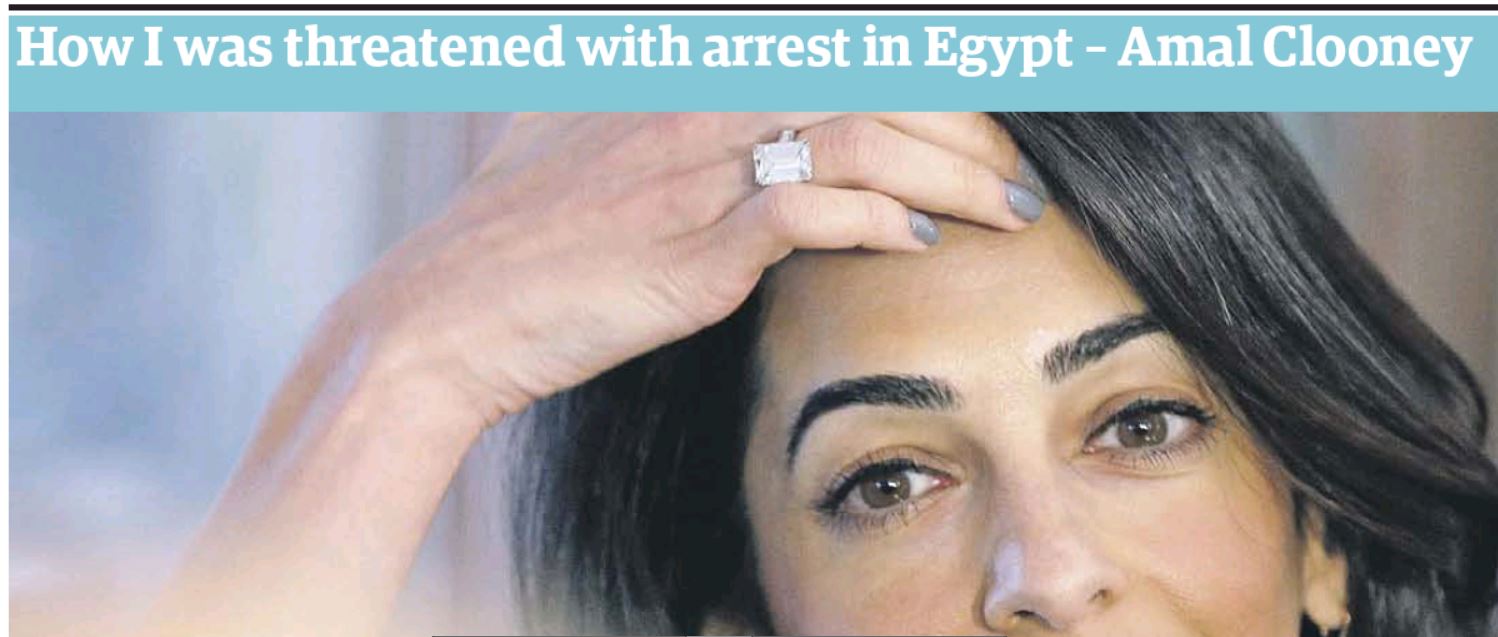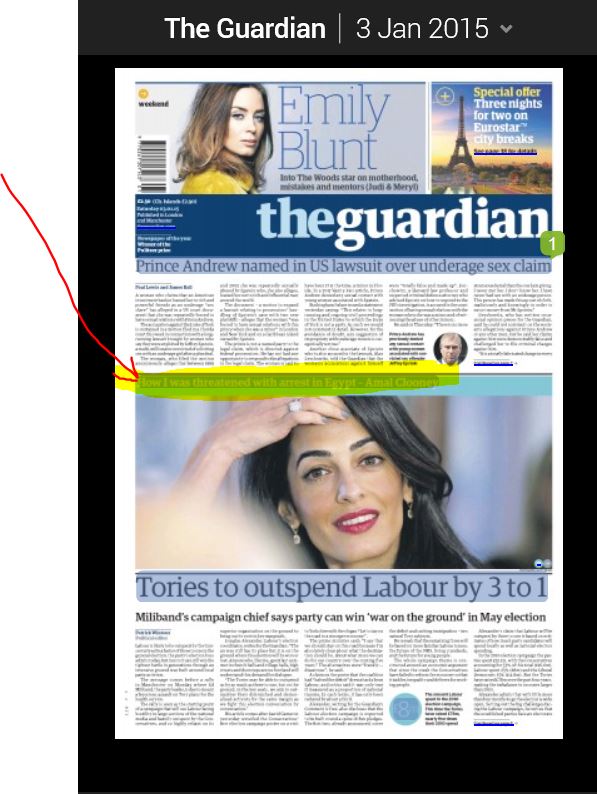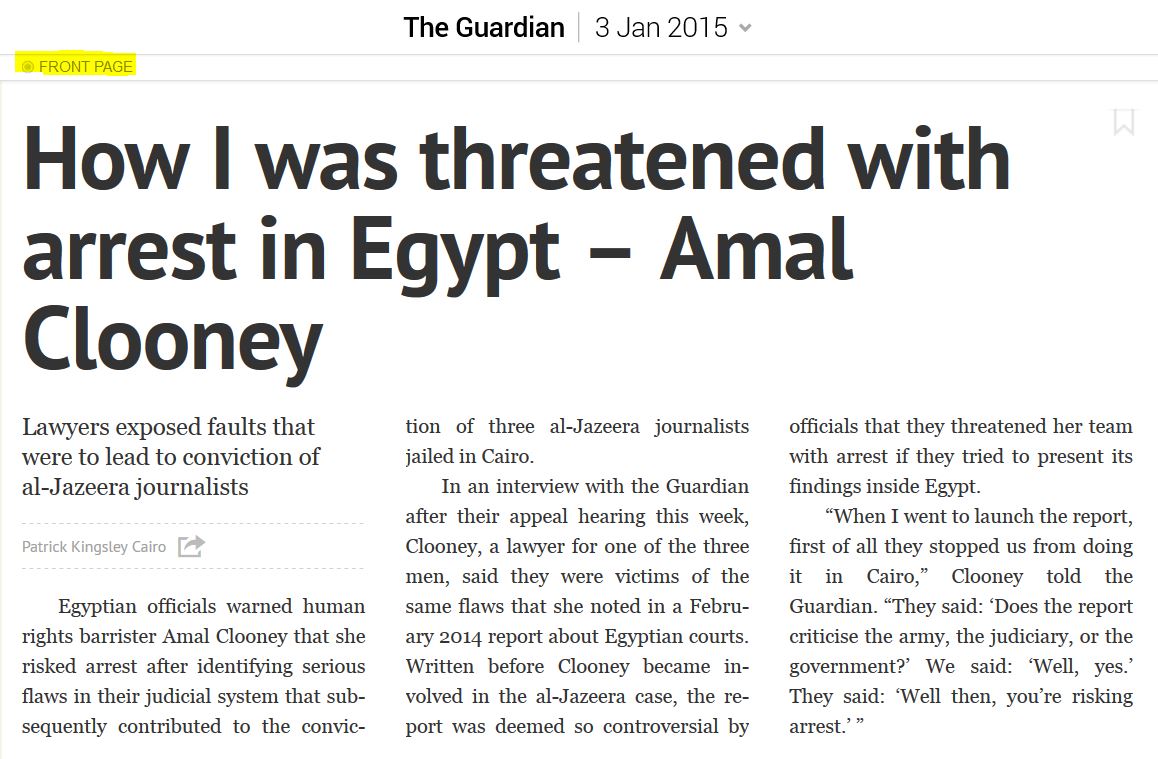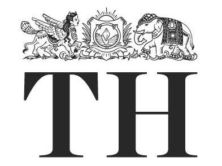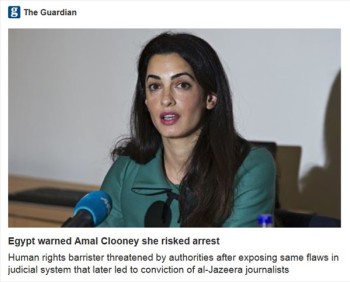
(Credit: Guardian)
Human rights lawyer Amal Alamuddin Clooney’s credibility has been put at risk by The Guardian.
Who is telling the truth? The Guardian reporter, Patrick Kingsley, or Clooney? Did Clooney get threats from Egyptian officials or not? Were false allegations of government intimidation made by Clooney or falsely attributed to Clooney by the Guardian?
George Clooney, Amal’s husband, has a history of fights with the media. Is a battle brewing?
Last week, The Guardian reported that Amal Clooney said she was “warned” by “Egyptian officials” that she “risked arrest” after writing a report critical of Egypt. The Jan. 2, 2015 front-page news story blasted around the world, from Hollywood to China.
Patrick Kingsley, the Guardian’s Cairo correspondent, stated that Egyptian “officials deemed [Clooney’s] report so controversial” back in Feb. 2014 that “they threatened her team with arrest” should they dare announce their findings in Egypt.
The Guardian’s headline and lede for this story—both of which are now rewritten– gave the false impression that Clooney was recently threatened.
Kingsley informed iMediaEthics by phone, “There was a problem, yes, initially. The headline [and lede] made it out to be a present tense…I apologized [to Clooney] for the mistake.”
Only careful readers would quickly see that this alleged threat from “Egypt” was made back in Feb. 2014, nearly a year ago, before her profile skyrocketed with her September marriage to Clooney during a different presidency and administration. And the threat wasn’t connected to her new role as lawyer for Mohamed Fahmy, one of the three jailed Al Jazeera journalists whose convictions were overturned on Jan. 1 by Egypt’s Cassation Court.
Now, in a new twist, Clooney denies having ever claimed that Egyptian officials threatened her, according to the Jan. 4, 2015 post on her blog hosted by Huffington Post and a press release.
Instead of being warned by Egyptian authorities that she could be arrested if she had presented her Feb 2014 report in Cairo, Clooney now says in a press statement and in the blog post on Huffington Post, that she was only warned by “experts” on the political situation in Egypt. (Emphasis ours)
An article was published in the Guardian newspaper on 2 January 2015 stating that officials threatened Amal Clooney with arrest in Egypt in connection with her representation of Fahmy. The incident that was recounted in fact arose in early 2014 when the International Bar Association’s Human Rights Institute (IBA) — which was organizing the launch of a report co-authored by Mrs. Clooney — was warned by experts in Egyptian affairs who were consulted on the launch that she and her colleague risked arrest if they launched the report in Cairo, in light of the criticisms made in the report and recent prosecutions for “crimes” like insulting the judiciary, government or military in Egypt. As a result of these warnings [from experts], the IBA decided that it was not safe to hold the launch in Cairo, and the authors were forced to hold it in London instead. This incident arose before Mrs Clooney’s involvement in the Fahmy case, before the current president was in office and in a context entirely unrelated to this case. The journalist has since apologized for the misleading presentation of this matter in the article and corrections were made to the text to attempt to address this.
But Patrick Kingsley told iMediaEthics, “I think as the story stands, it’s accurate.” Specifically, he stands by his interview with Clooney in which, he reported, that she stated it was officials, not experts, who indicated threats.
Kingsley ably defended his work: “The clarifications we were asked to make, following the article’s publication, related to the timing of the threat, rather than who made it. At no point was the claim about Egyptian officials retracted in our discussions.” He continued: “Amal Clooney checked and confirmed the quotation before publication. The interview was also recorded.”
For the record, Amal Clooney checked and confirmed the quotation before publication.
— Patrick Kingsley (@PatrickKingsley) January 5, 2015
The Guardian’s reporter says he quoted Clooney from his recorded interview: “’When I went to launch the report, first of all they stopped us from doing it in Cairo,’ Clooney told the Guardian. ‘They said: ‘Does the report criticise the army, the judiciary, or the government?’ We said: ‘Well, yes.’ They said: ‘Well then, you’re risking arrest.’”
So who are “they”? It certainly seemed to iMediaEthics, and apparently to click-baited people everywhere, that Ms. Clooney was referring to Egyptian authorities.
But the problem now, for both Clooney and Kingsley, is that no names or ministry affiliations were given by Clooney to Kingsley, nor did he ask for them, he told iMediaEthics. He felt he did not need to try to independently verify her claim by, perhaps, seeing if others had been similarly threatened or if they were told at the time [Feb 2014] Egypt officials were menacing her. Kingsley said, “I don’t think it was necessary in writing the story to ask her about it.”
| “[ Kingsley] felt he did not need to try to independently verify [Clooney’s claim]…” |
He continued, “We are talking about a globally respected human rights lawyer. I don’t think there is any question that Egyptian officials warned them against coming to Egypt. It was plausible. We don’t have to accuse her of lying.”
iMediaEthics called Clooney’s co-author for the 85-page Feb. 2014 report, Nasser Amin, Executive Director of the Arab Center for Independence of the Judiciary and the Legal Profession in Cairo. We asked him if he was aware that Clooney was threatened around Feb. 2014. “I don’t know. You have to ask her,” he said. I asked if he was ever threatened. “No, no one [from the government] told me that,” he answered.
“Should I have gone to other members of their team to see?“ the Guardian’s Kingsley responded to our asking if he should have sought independent verification. “[I] am not sure that was necessary.”
If the Egyptian threat were real, wouldn’t it behoove Clooney, as a responsible and caring human rights attorney, to get on the phone to warn her co-author living in Cairo?
Clooney previously revealed in a blog post on Huffington Post back in August that she had received threats related to presenting the report in Egypt. The way the blog post is written gives the distinct impression that the warning came from Egyptian authorities. (“The Anatomy of an Unfair Trial“) Emphasis ours.
“In June 2013, I headed a delegation from the International Bar Association — the largest association of lawyers worldwide — to advise on reforming Egypt’s judicial system and constitution. Our report criticized attempts by President Morsi’s government to silence critics by having them locked up and recommended reforms to the country’s judiciary. By the time we were to launch the report, a new government had come in under interim President Adly Mansour, but apparently nothing had changed. We were told to launch the report in London or risk arrest if we did it in Cairo.”
This Aug. 18, 2014 statement by Ms. Clooney on her blog hosted by Huffington Post revealing a threat makes the Guardian’s Jan. 2 report old news instead of a new revelation. (iMediaEthics emailed Huffington Post. The press representative declined to comment.)
To his great credit, Kingsley did make sure, he told iMediaEthics, to quickly rewrite the lede and the headline shortly after publication and apologized after Clooney and her client, Fahmy’s family, had called him to complain.
#pt Separately, an editing error led to an inaccurate initial headline and lede. These were corrected as soon as I was made aware of them.
— Patrick Kingsley (@PatrickKingsley) January 5, 2015
He also confirmed with iMediaEthics that he failed to fact check with any Egyptian government sources before publication, offering them an opportunity for rebuttal.
| “I didn’t fact check with Egypt, fair enough,” Kingsley responded. “Did I put it to Egypt [authorities]? No. Should I have? Yes. That would have been best practice.” |
This was also fixed, again to his credit, and an update was posted at the bottom of his Guardian report: “This article was amended on 4 January 2015 to include comments from the Egyptian police.”
Egyptian government sources vigorously deny Clooney’s and the Guardian’s claims as reported by AFP and Al Ahram.
iMediaEthics and Kingsley differed as to whether he should have fact checked what he reported as Ms. Clooney’s claim of having been threatened by Egyptian officials. Did he think now he should have followed up and asked Clooney the names and affiliations of the people who she said threatened her?
“No,” he told iMediaEthics, “She was referring to an incident that happened a while ago, which seemed plausible. I was happy with the way the interview went.”
Before iMediaEthics would publish such a damaging claim of a threat, we would require verification from any source –documentation such as emails, names of who threatened her, which ministries. Certainly, without question, we would contact people in the Egyptian government to offer an opportunity for rebuttal and to fact check Amal Clooney’s claim of menacing remarks with them.
Shockingly, Kingsley did none of these steps, as evidenced by his report and his admirable candor. iMediaEthics view: We hold Guardian editors supervising Kingsley accountable for failing to require such basic journalistic standards from him for fact checking and offering rebuttal opportunity and for re-writing the lede of his story without his consultation and, as a result, getting it wrong, according to Kingsley.
iMediaEthics called and emailed Mrs. Clooney multiple times. We spoke briefly with Jennifer Noone, Marketing Communications Officer for Doughty Street Chambers, Clooney’s law firm, who said she would forward my questions to Clooney amid the storm of media interview requests they have received.
Our email to Clooney:
In the next couple of hours on iMediaEthics, I will publish a story about the two versions of Ms. Clooney’s story about the threats. One version is that she was advised by experts that they risked arrest if they showed up in Cairo for the Feb. 2014 report announcement. The other version, continuing in the Guardian, is that Egyptian officials threatened/warned her and her team if they appeared in Cairo, Feb. 2014 related to the report announcement.
Since there is no correction appended to the article except this–“This article was amended on 4 January 2015 to include comments from the Egyptian police“–it appears that Ms. Clooney has changed her story as indicated both in the press release and in a Huntington Post article. She now says “experts”–not government officials in Egypt– stated that the Feb. 2014 report authors would be threatened by possible arrest if they announced their Feb. 2014 report in Cairo.
Questions
1. What are the names and affiliations of these experts? When did they offer the advice? Is there any documentation that supports this claim that it was the experts who said this?
2. Ms. Clooney wrote to the president of Egypt and others to protest or make requests. Why didn’t she seek out official permission to do the Feb. 2014 announcement in Egypt, instead of taking the advice of experts?
3. The Guardian reporter tells us he still thinks his story is correct, even though it states that government officials in Egypt made the threat/warning and states Ms. Clooney said so.
Would you respond to the following statements he gave iMediaEthics:
“The clarifications we were asked to make, following the article’s publication, related to the timing of the threat, rather than who made it. At no point was the claim about Egyptian officials retracted in our discussions.”
“Amal Clooney checked and confirmed the quotation before publication. The interview was also recorded.”
In the Kingsley’s report, there is one source–Ms. Clooney–and no independent verification.
If Ms. Clooney did not have names, this should have been reported by Kingsley and would have cast some doubt on her assertions. If she had a name, or names, this should have been reported to hold that person and ministry accountable.
It strains belief that she would not remember who threatened her. The turnaround from claiming that Egyptian authorities threatened her to it having been warnings from experts of possible arrests requires many more details from Ms. Clooney to be supported.
Egypt is a big place. If one person threatens you, maybe their boss or another ministry would not have approved of it? Why wouldn’t she have officially protested against such a threat if it were real? If a reporter from iMediaEthics had been threatened by Egyptian officials, we would have publicly protested such an outrage, and we don’t have a giant legal organization behind us.
Ms. Clooney herself, should now be held accountable for her allegation. If she does not, cannot or will not back it up, the shift of responsibility for her story moves from The Guardian to her
To the point: What makes this story especially suspect is Kingsley’s failure to ask Clooney to name who, or even what Egyptian ministry threatened her. To claim on only Clooney’s say-so that “Egypt warned Amal Clooney she risked arrest” in the headline and in the lede paragraph, “Egyptian officials warned human rights barrister Amal Clooney that she risked arrest” is a major journalism methodology fail.
iMediaEthics asked Kingsley why no correction at the bottom of his article discloses his apology or the correction for the editing errors that were made to the headline and the lede? We are waiting for his response.
UPDATE: 1/5/2015 6:31PM EST iMediaEthics still hasn’t heard from Kingsley in response to our inquiry asking why there is no correction at the bottom of his article to disclose his apology and other changes made to the headline and lede. iMediaEthics has asked the Guardian’s readers representative Chris Elliott if his office will look into this matter.
UPDATE: 1/6/2015 1:37PM EST Here is the Guardian’s reader’s editor Chris Elliot article –over 1200 words–attempts to explain the complex series of multiple errors and corrections over several days: “The readers’ editor on… mistakes made in an article about Amal Clooney and the ‘al-Jazeera three’ jailed in Egypt“; The sub-head states: “The Guardian conflated two key aspects of the story, and initially published it under a significantly misleading headline; I apologise on behalf of the newspaper for those errors. ”
Read key paragraphs by Elliot that iMediaEthics will have to pursue before we can claim understanding.
When the Guardian asked Clooney on 5 January for more details of the individuals who gave the warning, she replied that the language she used had been reviewed by a colleague in the International Bar Association’s Human Rights Institute who was involved in writing the report and organising the launch, who agreed with the description that they were “experts in Egyptian affairs”.
I am not able to establish any more details about them. I think the Guardian believed that, in the context of the interview, the “they” to which Clooney refers were Egyptian officials who had given the warning. But we didn’t confirm that before publication, and in the light of that we have made a further set of changes to the headline, subheading and text.
The Guardian has also run a correction that needs a correction to be consistent with the reader’s editor’s statement above. (Emphasis ours–see below).
Guardian correction at bottom of Kingsley’s article:
- An article about the human rights lawyer Amal Clooney, who is representing one of the three al-Jazeera journalists in an Egyptian jail, conflated two key aspects of the story. Due to editing errors, the headline in the online version and text gave the impression that Amal Clooney risked arrest in connection with her representation of the journalist. In fact she was warned in February 2014, before her involvement in the case, that she risked arrest as a result of a report in which she earmarked flaws in the country’s judicial system. The same flaws subsequently contributed to the three men’s conviction (Amal Clooney risked arrest over report on Egypt’s legal flaws, 3 January, page 19).
Mistakes made in story about Amal Clooney and the ‘al-Jazeera three’ jailed in Egypt | Chris Elliott http://t.co/QUCXoaVuqE
— Chris Elliott (@chriselliott57) January 6, 2015
——————————————————————————————————————–
This story is part of iMediaEthics’ Investigative series on international media reporting on Egypt. iMediaEthics’ editor-in-chief and publisher, Rhonda Roland Shearer, spent much of May, June, October and November in Egypt reporting for this series. She worked with Nader Gohar and his CNC team to produce video reports for iMediaEthics. An Arabic Version of this story is coming soon.
——————————————————————————————————————–
CREDITS
Researcher/Translator: Mai El Shamy

